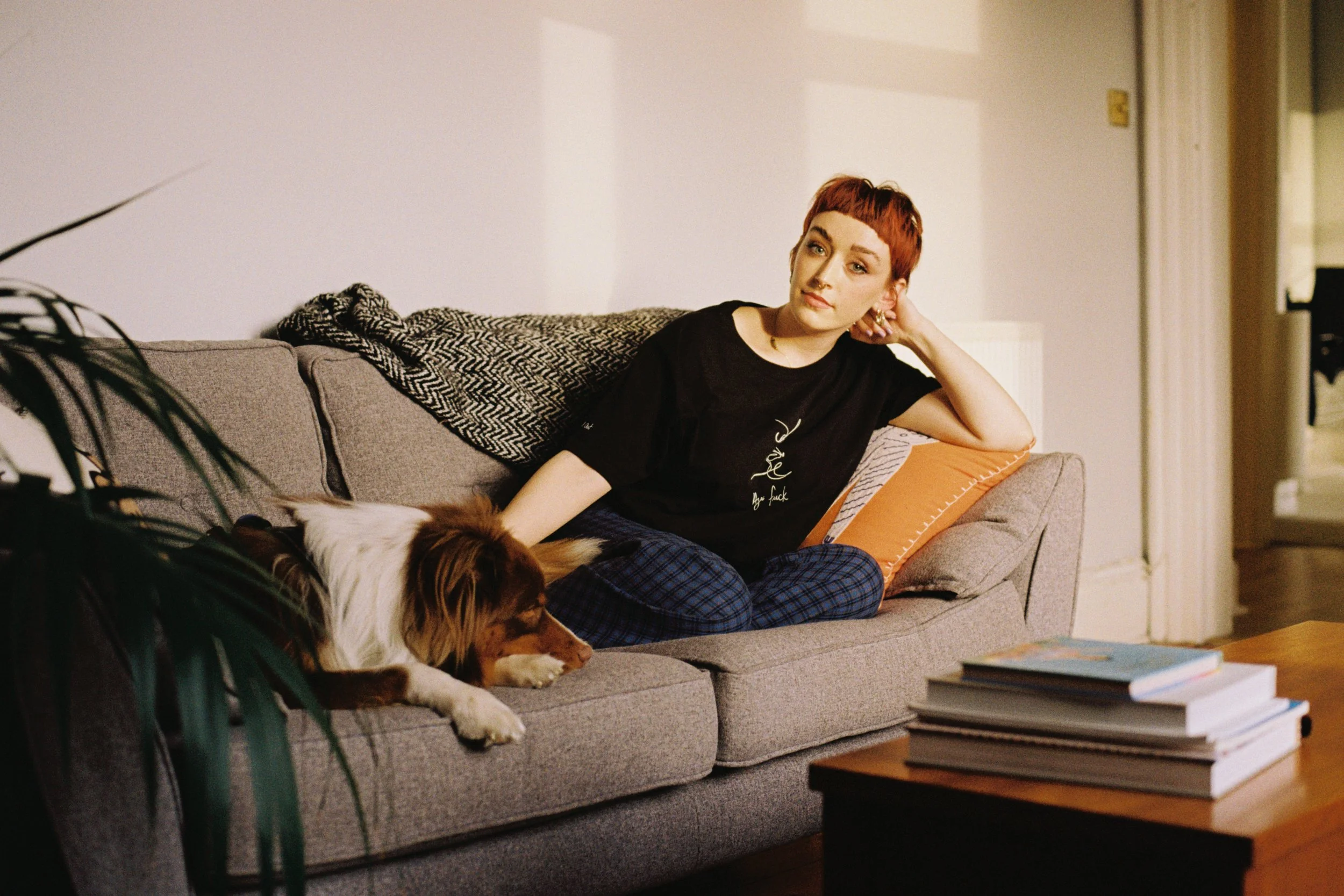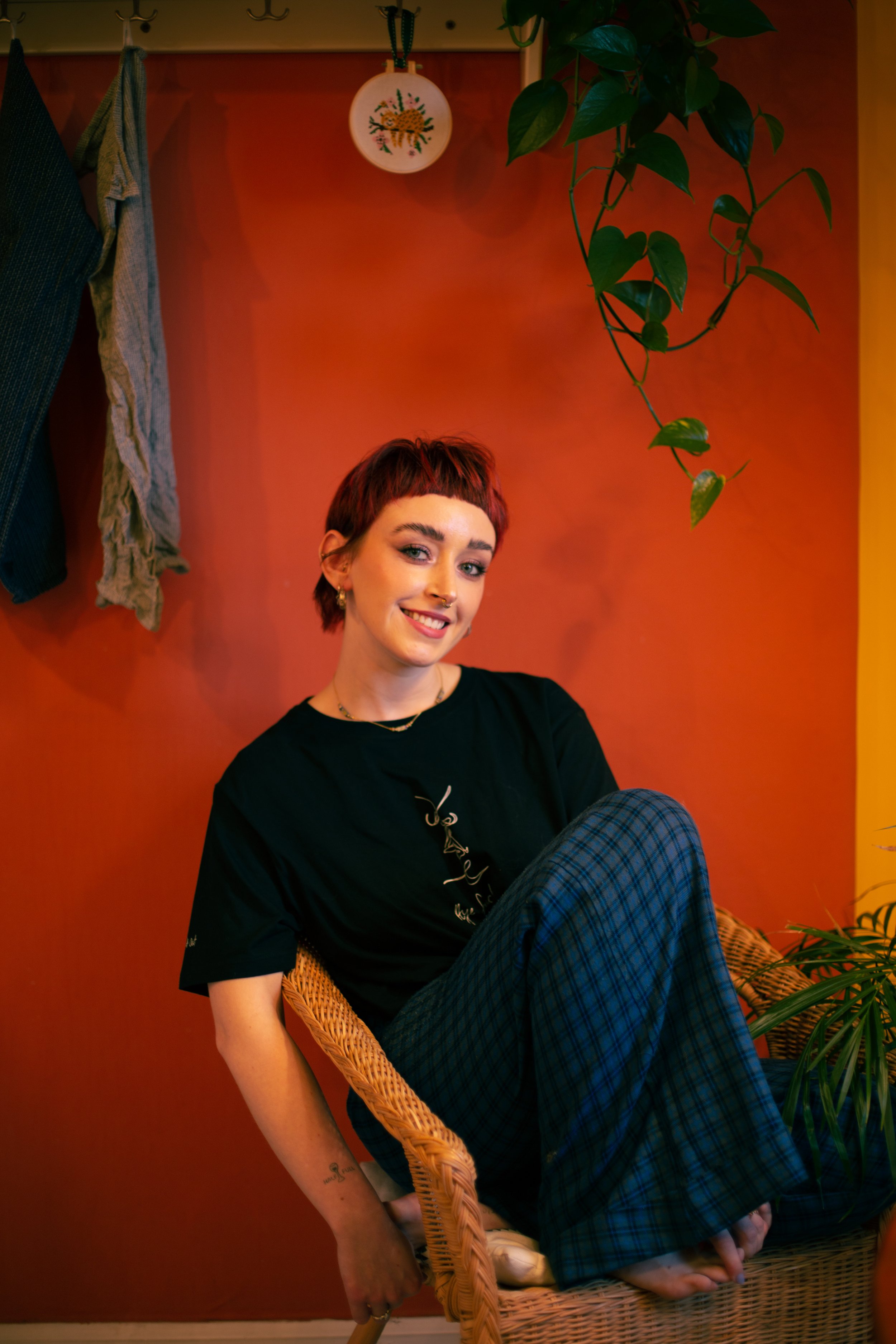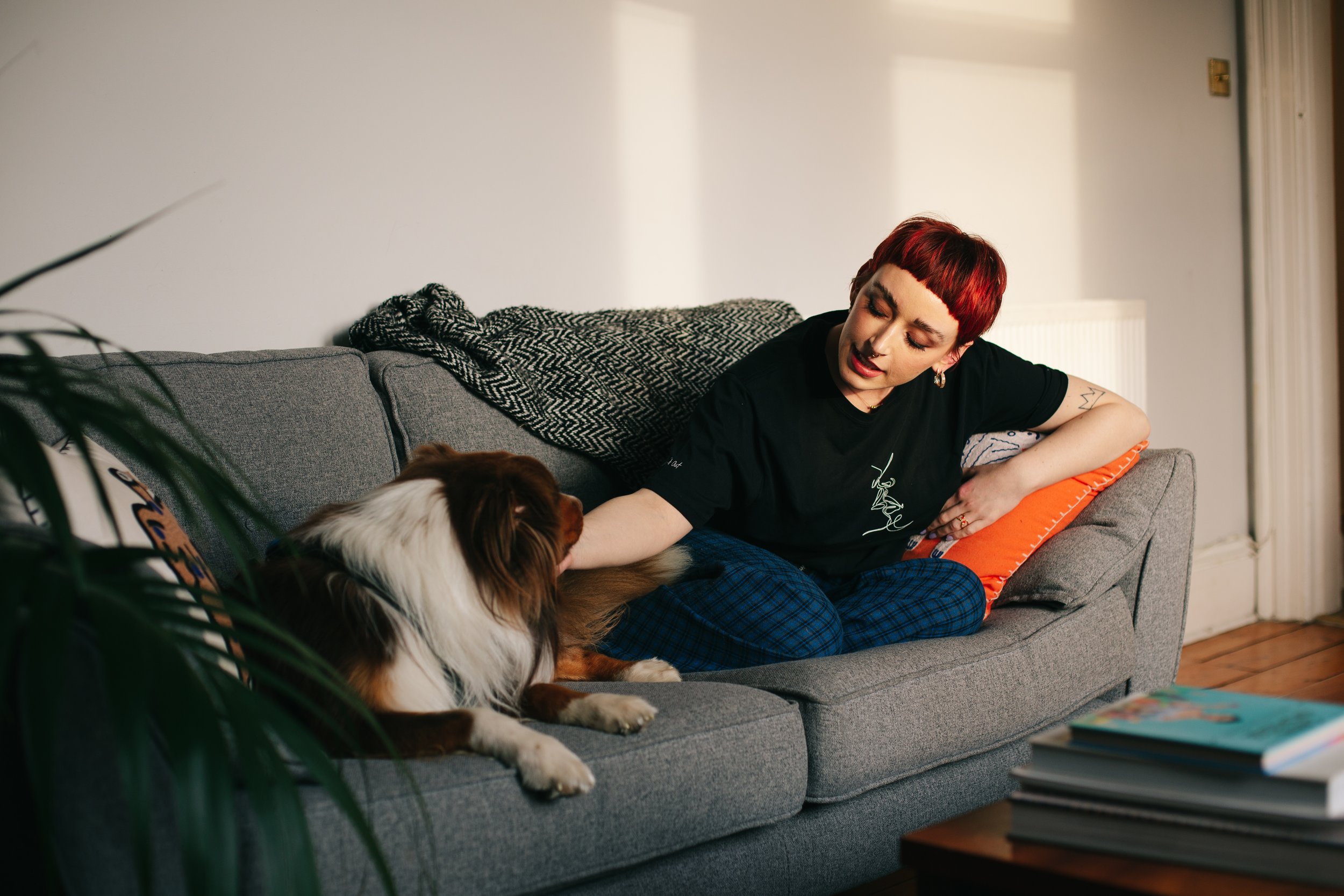
EMILY
Love it or hate it, the internet has played a core part in feminism’s fourth wave this past decade. Through our voices connecting online, we’ve managed to reveal a whole host of common experiences between women and non-binary people. Remember back when street harassment was still considered a “compliment”? Or when #MeToo stormed the internet and we all found out that, yes, more than a few of us had been assaulted? It’s thanks in part to platforms like Tumblr, Twitter and, now, Discord that we’ve been able to connect those dots.
Now joining the fray is Emily King, trainee sexologist and founder of the group Horny4Change, a blog and podcast that speaks openly about pleasure, relationships and sexuality as a means to eradicate violence against women and girls. Emily became interested in this work last year after graduating from her International Development degree, where her research showed just how influential sex education and online platforms could be at preventing gender-based violence.
1 in 4 women have been raped or sexually assaulted as an adult, according to Rape Crisis England, a figure that, according to Emily, signifies nothing short of a humanitarian crisis. We urgently need to address the reasons why such violence persists (*cough* the patriarchy *cough*), and Emily believes that open conversations about pleasure, and how we find it, are key.
We spoke to Emily about the transformational effects of pleasure and online platforms, and how we might get more cis men on board within the movement.
A lot of your work involves talking about how people can experience pleasure for themselves. What do you think the link is between pleasure and the fight to eradicate gender and sex-based violence?
Emily: I always like to say there's less of a grey area in pleasure. I think we hear that there’s a grey area of consent, and no one really knows how to talk about it. What if we literally give people the language and the awareness that it's supposed to be enjoyable, it is the bare minimum.
When I became sexually active, I was sexually active for a year, maybe two years, before I realised I was supposed to be experiencing pleasure, which I think is terrifying. That itself perpetuates rape culture so clearly, because what I'm supposed to do as a young woman is lie there and have something happen to me, but it's not mine to participate in.
Teaching pleasure straightaway teaches autonomy. This is your body, you have the right to learn about it. It's yours to explore with whoever you want to on your terms. Me and my friends had a abstinence-based sex education. If someone had literally just said the words “it's supposed to be enjoyable, and it can be a positive thing”, it would have helped so much.
You talk about a broad range of things on your platform – from assault to lube to using sex toys. Has your audience ever surprised you with what they contribute to the conversation?
Emily: Every time we get a submission asking for help, I'm surprised. First of all, they write it really elegantly and beautifully. They set the scene. But they are so vulnerable and so open about things that are really hard to talk about. One man asked about his fantasy of roleplay regarding penis size – he had a fantasy about listening to his female partner talk about the other people that she had slept with and how they're so much bigger than him. And I just loved it. It was all about navigating it for his partner to enjoy as well and how to be respectful and not put pressure on.
In the first episode of your podcast, when a man wrote in confessing that he had pressured his girlfriend into sex, you talked about needing to “humanise violence against women”. Why do you think that is important?
Emily: That was a fascinating question. I think it says so much that the day we received that question was the day the question box went public. I thought, have you just been sitting there waiting to ask this anonymously?
At one point Gina (who does the podcast with me) and I mentioned statistics that came out recently about the number of women and girls who have been sexually assaulted – where are the statistics about the amount of men who assault and sexually harass? Sexual harassment doesn't have a face. It's still kind of abstract for some reason, even though it's so widespread.
I think that that perpetuates the ability to turn a blind eye, because it's floating around in the ether, but no one really knows anyone who's done it. That allows people to turn away and say, “not my problem”. But actually it is your problem. You've probably committed some sexual aggression, something non-consensual.
There's obviously a scale to this. There is making a mistake completely unintentionally, and then there is committing extreme sexual aggression. It's not the same thing. But there needs to be a discussion with men about it. They maybe don't realise the extent of their actions because it is so normalised. It's 97% of women and girls at this rate who have experienced sexual harassment. So what is the percentage of the harassers? Huge, and it's people that we know.
I think that podcast episode was a bit of a wake up call, because a few men contacted me after and said that it really got them thinking, hearing a man say, “I think I pressured someone into sex,” and having to deal with it. It is powerful when people are open about making mistakes, no matter how big or small. It really encourages other people to reflect. Being able to say, “Actually, I'm part of this problem. What can I do? I'm listening,” that's what we need.
Why do you think online platforms like Horny4Change can be powerful spaces for sex education?
Emily: My research showed that specifically people from the LGBTQIA communities found a lot of support through online spaces. Because if you're neglected by the entirety of the education system, where do you go? And it has been good because the people who follow Horny4Change are from all over the world. That brings up so much diversity in perspectives, but yet emphasises that we're wanting all the same kind of things.
On the one hand, I love how much potential there is. In terms of how feminism has advanced within the last decade, there are things that we have come to learn aren't an isolated issue, like gaslighting. There are people out there who thought that was happening only in their relationship and was only their problem. When you have the opportunity to see things as a bigger picture, you recognise this is actually a systematic issue.
But I'm getting bogged down at the minute with how superficial it can be, specifically in terms of the algorithm. I really value sex education and relationships education, and I feel like trying to squeeze things into an algorithm, it's devaluing it. It's a struggle, because you really want people to engage for more than 10 seconds.
Femtech companies like Daye say that they struggle with censorship on Instagram. Have you found that your content suffers as well?
Emily: Absolutely. If I accidentally write “orgasm” instead of “org@sm” no one will see Stories. You do recognise when you are being punished by the algorithm. I have had my account suspended twice for very bad behaviour. I put up a photo of a QR code, which I had printed as a sticker that people would scan and it would bring them to my website. And it just said "Horny?". Instagram did not like that.
It's very clear who is permitted space to talk about things. Tommy Lee put up a naked photo, that was a recent thing. His penis was in frame. It was up for days. That really boils my blood, because it's the most frustrating thing trying to teach mainly people who identify as female that their body isn't inherently sexual, and you can touch yourself in a non-sexual way and it's self-soothing and it's autonomous, and then they aren't allowed to show a specific part of their body because it's sexual. All that teaching is undone in five seconds.
On your website, you mention wanting cis heterosexual men to participate more in the fight against gender and sex-based violence. How have men reacted to Horny4Change so far?
Emily: This is something that I think is a no brainer at this point. To get to the root of the issue, we need to change male thinking. As soon as I started Horny4Change, I was met with really horrible messages and comments on a lot of my posts. I really hit a brick wall when I was getting sexual messages unconsensually in my DMs, because as a result of me talking about the concept of sexuality and pleasure, that apparently is just me talking about my own sexuality and pleasure and what I like. There seems to be almost an inability in some people's minds to separate a person from a larger topic.
It was a big reminder to me, it's actually still very risky having these conversations publicly. And that kind of motivated me to do it more, because it shouldn't be. We should be able to talk about this.
How do you think we can bring more men into the conversation?
Emily: My research project made it very clear that there needs to be male involvement on the educating side. There's a programme that is focused on the Global South, where women gather male activists from universities, from schools, and they take them into a massive training day. The men have the desire and the curiosity but they're also willing and understanding of the fact that they need to speak what they're being told. It's about the women's experience. They then hold workshops with men. So the male audiences of these workshops see a male facilitator and educator and they are much more willing to engage.
It is frustrating, but I think let's just be realistic. As a woman, I identify with people that I am talking about sensitive issues with, so I can empathise with that. But it requires collaboration. I think it really needs to be an open two-way dialogue of what the people who are most impacted by the inequality needs, and what the people who benefit from that system can do for us and with us.
Photography by Laura Prieto
Interview by Becca Inglis













